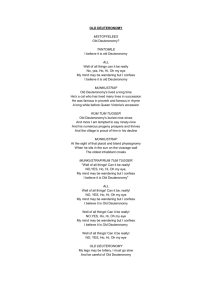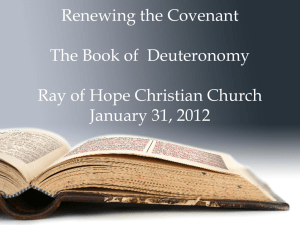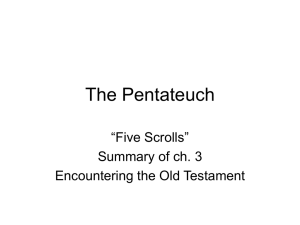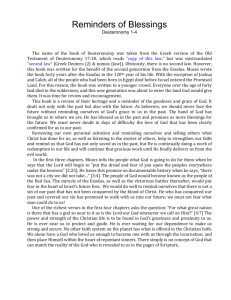CHAPTER FIFTEEN OBJECTIONS ANSWERED All this, however, is
advertisement
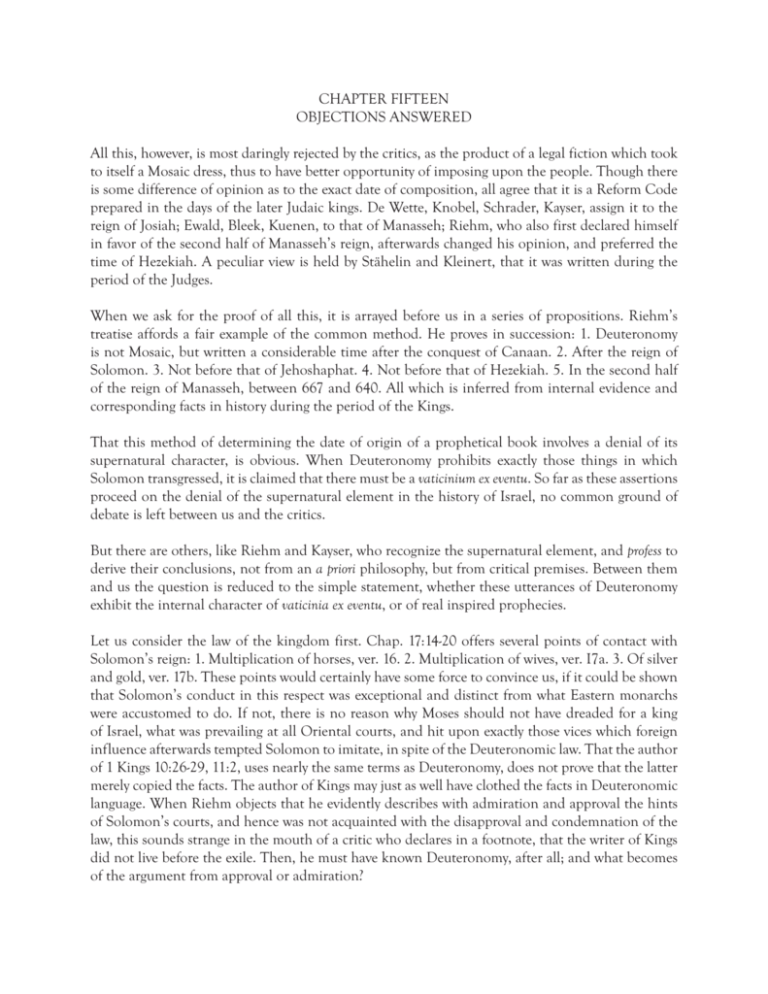
CHAPTER FIFTEEN OBJECTIONS ANSWERED All this, however, is most daringly rejected by the critics, as the product of a legal fiction which took to itself a Mosaic dress, thus to have better opportunity of imposing upon the people. Though there is some difference of opinion as to the exact date of composition, all agree that it is a Reform Code prepared in the days of the later Judaic kings. De Wette, Knobel, Schrader, Kayser, assign it to the reign of Josiah; Ewald, Bleek, Kuenen, to that of Manasseh; Riehm, who also first declared himself in favor of the second half of Manasseh’s reign, afterwards changed his opinion, and preferred the time of Hezekiah. A peculiar view is held by Stähelin and Kleinert, that it was written during the period of the Judges. When we ask for the proof of all this, it is arrayed before us in a series of propositions. Riehm’s treatise affords a fair example of the common method. He proves in succession: 1. Deuteronomy is not Mosaic, but written a considerable time after the conquest of Canaan. 2. After the reign of Solomon. 3. Not before that of Jehoshaphat. 4. Not before that of Hezekiah. 5. In the second half of the reign of Manasseh, between 667 and 640. All which is inferred from internal evidence and corresponding facts in history during the period of the Kings. That this method of determining the date of origin of a prophetical book involves a denial of its supernatural character, is obvious. When Deuteronomy prohibits exactly those things in which Solomon transgressed, it is claimed that there must be a vaticinium ex eventu. So far as these assertions proceed on the denial of the supernatural element in the history of Israel, no common ground of debate is left between us and the critics. But there are others, like Riehm and Kayser, who recognize the supernatural element, and profess to derive their conclusions, not from an a priori philosophy, but from critical premises. Between them and us the question is reduced to the simple statement, whether these utterances of Deuteronomy exhibit the internal character of vaticinia ex eventu, or of real inspired prophecies. Let us consider the law of the kingdom first. Chap. 17:14-20 offers several points of contact with Solomon’s reign: 1. Multiplication of horses, ver. 16. 2. Multiplication of wives, ver. I7a. 3. Of silver and gold, ver. 17b. These points would certainly have some force to convince us, if it could be shown that Solomon’s conduct in this respect was exceptional and distinct from what Eastern monarchs were accustomed to do. If not, there is no reason why Moses should not have dreaded for a king of Israel, what was prevailing at all Oriental courts, and hit upon exactly those vices which foreign influence afterwards tempted Solomon to imitate, in spite of the Deuteronomic law. That the author of 1 Kings 10:26-29, 11:2, uses nearly the same terms as Deuteronomy, does not prove that the latter merely copied the facts. The author of Kings may just as well have clothed the facts in Deuteronomic language. When Riehm objects that he evidently describes with admiration and approval the hints of Solomon’s courts, and hence was not acquainted with the disapproval and condemnation of the law, this sounds strange in the mouth of a critic who declares in a footnote, that the writer of Kings did not live before the exile. Then, he must have known Deuteronomy, after all; and what becomes of the argument from approval or admiration? The narrative of 1 Sam. 8 has also been used, or rather abused, to deny the authenticity of this law. What is there condemned, is here commanded. But such a summary statement leaves out of account several facts. First of all, Deuteronomy does not command, but merely allows, the institution of the kingly office. It does this with certain restrictions touching the points which would tend to make the office an object of national pride, derogatory to the honor of God, to whom alone such glory was due among Israel. The passage bears all the evidence of being a restrictive law. In one sense a kingdom is permitted, but evidently this permission is but subsidiary to the prohibition of it in another sense. It is clearly stated what the Israelites would be allowed to have, in order to bring out more emphatically and distinctly what they would not be allowed to desire. So, whilst there is no command in either sense, the whole is equivalent to a prohibition in the one sense. The restrictions stated constitute the very essence of kingly pride among the heathen nations of the East. Considered in this light, the Deuteronomic law not merely does not contradict, but strikingly confirms, the narrative in Samuel. The people desired exactly that kind of royalty which the Code prohibited, and from the very motive which the law condemned. Because the nation wished to transfer the national pride which it should have had in God alone to an earthly monarch, the spirit of the law was violated, even though the transgressors dared to quote its letter in their favor. That other causes co-operated with this to make the desire sinful, is not denied. Schultz has discussed the matter very thoroughly, though he seems to seek the solution rather in a peculiar interpretation of 1 Sam. 8 than of Deuteronomy. The law presents no features which are not fully consistent with its Mosaic origin. But it contains some statements which are inconsistent with a later origin. The following may be noted: (a) The prohibition to confer royal authority upon a stranger, ver. 15. For this the whole post-Mosaic period offers no single point of contact. What Professor Robertson Smith adduces, rests on the misinterpretation of an isolated passage, Isa. 7:6. (b) The reminiscence of Egyptian servitude, ver. 16. How the multiplication of horses could tend to make the people return to Egypt, has never yet been satisfactorily explained on the critical hypothesis. Riehm’s explanation, together with his view of the passage 28:68, rests on ingenious but unwarranted combinations, by which more is assumed than history has recorded. (c) If this law had been forged in a time when the kingly office had existed for many centuries, it is impossible that no more definite and concrete statements should have been made. The same remarks apply to the institution of Judges, and of what the critics would call a supreme court (Deut. 17:8-13). Both are the necessary result of the people being scattered over the land immediately after the conquest. Here also the critics have substituted for this very natural interpretation an extremely forced one. They claim that Deuteronomy gives only the abstract statement of what Jehoshaphat had introduced in the concrete. But law and history conflict in so many points, that only a superficial acquaintance with both can make the one the reflex of the other. The following are essential differences: (a) Deuteronomy presents as future what under King Josiah had already existed for a considerable time. (b) What Jehoshaphat instituted was really a supreme court, consisting of Levites and laymen, with two presidents, — the high-priest Amariah, and Zebadiah the son of Ishmael. Deuteronomy knows nothing of this: the judge in ver. 9 is only the occasional president at the local court at the seat of the sanctuary, and he owes his right of decision in cases of appeal to his benefit of priestly assistance and instruction. The high-priest in ver. 12 is not introduced as such, but merely in his priestly capacity, to indicate that his assistance was not a matter of judicature, but of instruction. (c) The absence of concrete and detailed statements is here also a strong testimony against later origin. As the law of the kingdom does not warrant us in bringing Deuteronomy down to Solomon’s time, so that of the Judges does not prove its origin during or after the reign of Jehoshaphat. More general, but most whimsical and worthless of all, is the argument derived from the promises in chap. 18, that prophets like Moses would succeed him, and specially the reference to false prophets from ver. 20 onward. By remanding all this to a later time, we take away the only basis on which to rest prophecy. The eminent position and undisputed authority of later prophetism become a mystery when the law had made no provision for both. This is an apt illustration of the untenable positions to which the critical theories lead. If, as has been customary of late, prophecy is not considered as the fruit and interpreter of law, but law as the petrifaction of prophecy, the latter of necessity comes to hang in the air. The reference to false prophets, if it proves any thing, will prove against the later origin. In ver. 22 the people are exhorted not to be afraid of them, wnmk rwgt )l. In what a contrast does this supposed denunciatory character of the false prophets stand to the later reality! (compare 1 Kings 22: 22, seqq. Isa. 9:15; 30:10; Jer. 14:13, 14). Another feature which forbids us to think that the author had the development of prophetism behind him, is the promise that the prophets would be like unto Moses. So only God and Moses could speak. None of the later prophets ever thought of claiming equality with Moses. In Deut. 4:19, 17:3, star-worship is emphatically forbidden. The historical books mention, that after the schism it became prevalent at first in the Northern kingdom, afterwards also in Judah, in the time of Ahaz and Manasseh. Hence the critics inferred, that this kind of idolatry was not of Canaanitish origin, but was imported from the Far East, and not known before the schism. The protest of Deuteronomy against it then proves its later origin. We need not determine to what influences the increasing popularity of star-worship under the later kings was due, but have only to show that prior to this star-worship existed. This does not merely follow from the second command of the Decalogue forbidding to make a likeness of any thing “in heaven above,” but also from the statement of Amos 5:26. The prophets of the Assyrian period refer to it; e.g., Isa. 17:8 (where the Revised Version has sun-images). Also the name Beth-shemesh (house of the sun) is noteworthy in this respect. Schultz calls attention to the fact that the service of Baal and Astarte was connected with star-worship; but, as Deuteronomy treats of this idolatry separately (4:3, 12:31, 18:20), the passage (4: 19) must refer to something distinct from it. That Deuteronomy considers this cult under the aspect of nature-worship, and not so much of Polytheism as it came pre-eminently to be afterwards, makes the acquaintance of the writer with this later state of affairs improbable. The phrase Ndryh rb(b (beyond Jordan) has been appealed to as indicating the true stand-point of the later writer. It is used interchangeably of the east and the west side of the river. In making this fact a proof of later origin, the critics involve themselves in a serious difficulty. All evidence of Mosaic origin is summarily dismissed with the remark, that the Deuteronomist would take care to reproduce faithfully the Mosaic situation. In all other instances he succeeded so completely, that for centuries all critical opinion was led astray by his fiction. How, then, could he fall out of his role here? Even granted that Deuteronomy is non-Mosaic, the double sense in which the writer employs the phrase puts beyond doubt that he considered it as geographically fixed already in the Mosaic time. Still, it is most probable that even in this case he would not have made Moses employ it of the east side, for fear that people less instructed in ancient geographical terminology might suspect the Code on account of this expression. Riehm, feeling this, tries to protect the Deuteronomist against this charge of thoughtlessness, by saying that he continually distinguishes between his own work and the discourses of Moses, and that in the latter the phrase is only applied to the western country. Chap. 3:8 is enough to overthrow this notion, where Moses himself speaks “And we took . . . the land that was Ndryh rb(b from the river of Arnon unto Mount Hermon.” Riehm is under the necessity of declaring the latter words to be a gloss of a later hand; but with the same right we might declare all passages where the term is applied to the eastern country interpolations, which would certainly be the easiest way to relieve the whole difficulty. As the matter stands, the critics may choose between admitting that the Deuteronomist fell out of his role here, which will add the more weight to other evidence of Mosaic origin, or that he thought Moses could have spoken thus. We take the latter alternative in view of the impossibility that a man who wore his mask so well should have made such a blunder here, and because we do not see why Moses and the Israelites in general could not be familiar with a settled phrase like this. The western side was at all times, even from the days of the patriarchs, the real Canaan, the fixed point, determining the usage of all relative terms. Much more could it be so for Moses, who continually in the prophetic spirit transfers himself to the future time, and speaks for the period when Western Canaan would be already conquered and occupied. We close with noticing a few positive arguments which make the later origin of Deuteronomy very improbable. 1. The military law of chap. 20, which commands emphatically the extirpation of the Canaanites, is out of place in the time after Solomon, since he made the remnant of Canaan’s heathen inhabitants servants to Israel in a peaceful way. The warning against an idolatrous cultus may not have been superfluous at a later date; but the military law had become utterly unmeaning, and the latter could never have been used as a safeguard against the former. Professor Robertson Smith admits that “this feature points us directly back to the days of Moses.” 2. The curse upon Amalek (chap. 25:17) leads to the same conclusion. According to 1 Chron. 4:43, the last remnant of the Amalekites was destroyed by the tribe of Simeon positively not later than the reign of Hezekiah, as even Graf and Kayser admit. That the passage is simply repeated from Exod. 17:14 will not help us. Kayser should have made clear what occasion there was in Josiah’s time to make the repetition. 3. The hostile attitude towards the Ammonites prescribed in 23:3-6 could be explained just as well from the later times. Parallel passages are found in Jeremiah and Zephaniah. But the friendly feelings towards Edom lack all points of contact with the history of the seventh century. The same applies to the mention of Egypt (23:7). Until the destruction of Jerusalem the prophets speak of Edom as the representative of the enemies of God’s people. A command, “thou shalt not abhor an Edomite,” would be unparalleled in the prophetic literature of Israel. When Kayser tries to show that Judah was occasionally on friendly terms with Edom, his quotations do not prove this. Riehm infers from the tendency in Hezekiah’s time to seek the alliance of Egypt, that this required a friendly relation to the Edomites, and that accordingly the Deuteronomist would recommend it. But both Kayser and Riehm have overlooked that Deuteronomy is written in a prophetic spirit, and could by no means approve of this tendency to lean upon Egypt, or favor any thing resulting from it, since all the prophets unanimously condemn such associations. It is therefore impossible that the writer should speak in such terms of Egypt. Josiah himself, whose conduct better expresses the theocratic spirit out of which Deuteronomy must have been written, according to the critics, opposed Egypt, and lost his life in doing so. 4. Deut. 12:15 contains a modification of the law Lev. 17), which was practicable only during the desert-journey, when the people lived in the immediate vicinity of the tabernacle. Its impracticability at any other time is self-evident. Even the plurality of sanctuaries afterwards would not have made it practicable, since they were by no means so numerous that all slaughtering of animals could be done in their neighborhood. 5. Several laws present features that become unintelligible in the light of later conditions. For instance, 20:5-8 makes military service almost a matter of free choice. How could this be in the warlike period of the later kings? Compare also 22:13-21, evidently an old custom, which must have been antiquated long before the seventh century; also 27:21. 6. Though Deuteronomy is eminently prophetical in one sense, it is in so far distinguished from the later prophets, as that no reaction appears against ceremonial formalism. This is an unequivocal sign that such a contrast did not yet exist. Positively the ideal character of the law is exhibited, but nowhere is observance of its external prescriptions negatively condemned. The critics, who make such an extensive use of this latter feature in their interpretation of the prophets, should at least have wondered why it is entirely lacking in Deuteronomy. 7. Finally, this fact speaks against a later origin, that, so far as would appear from Deuteronomy, the passing of Jordan, the complete conquest of Canaan, and its quiet, undisturbed possession, coincide. This is wholly inconsistent with the theory of historical retrospection. The latter knew that a long period had been necessary to subdue the Canaanites, and that the task was not fully accomplished before Solomon.
